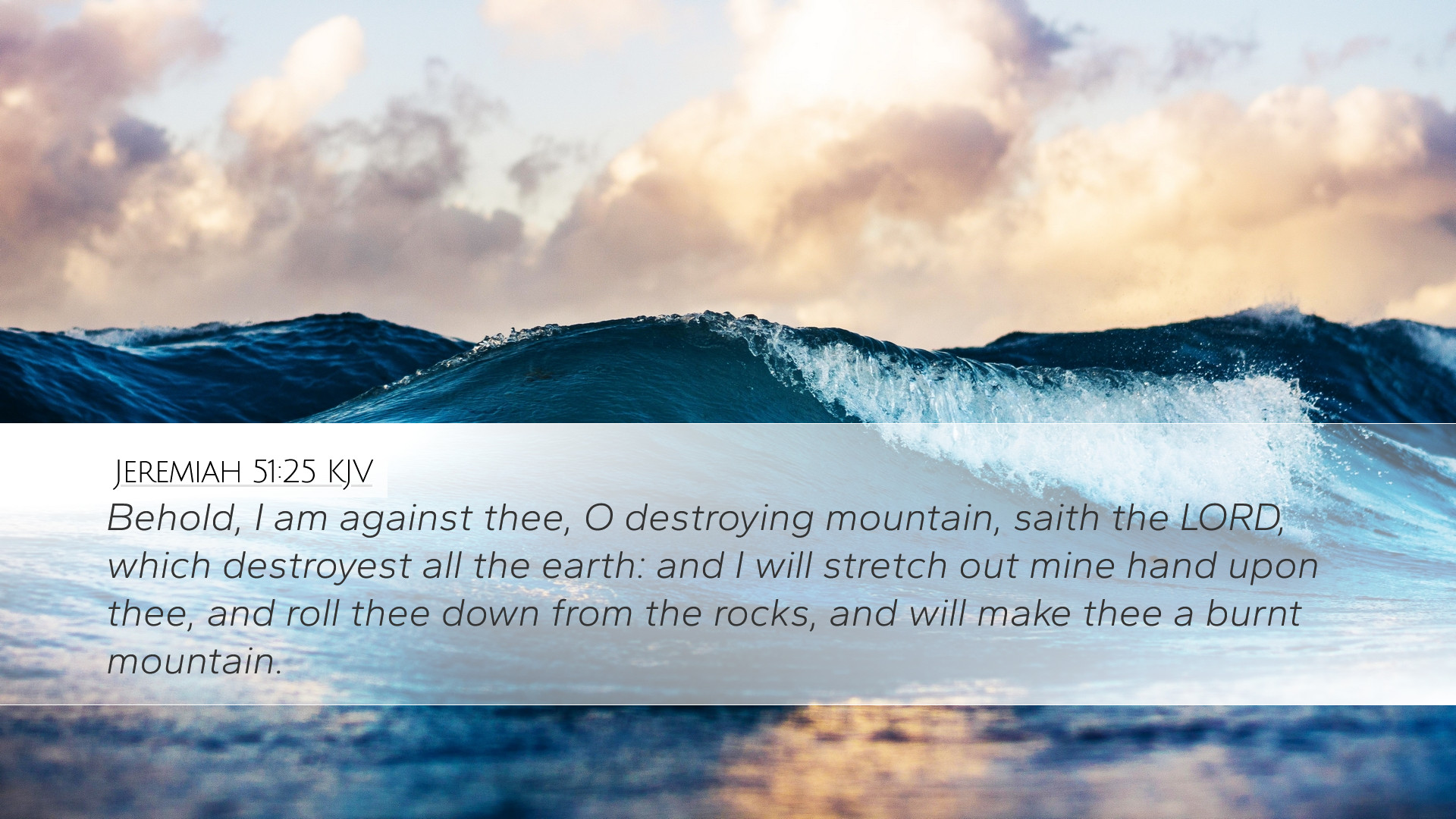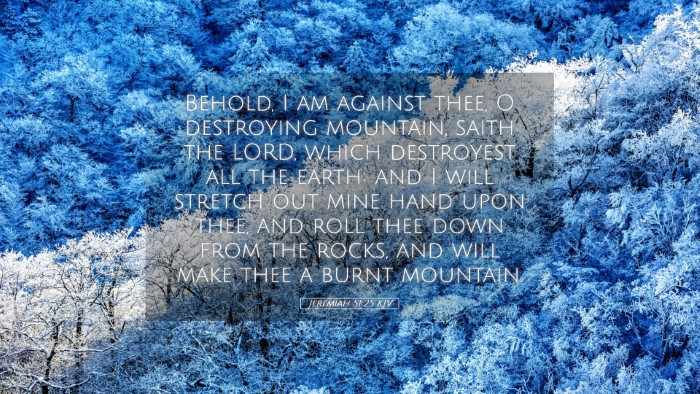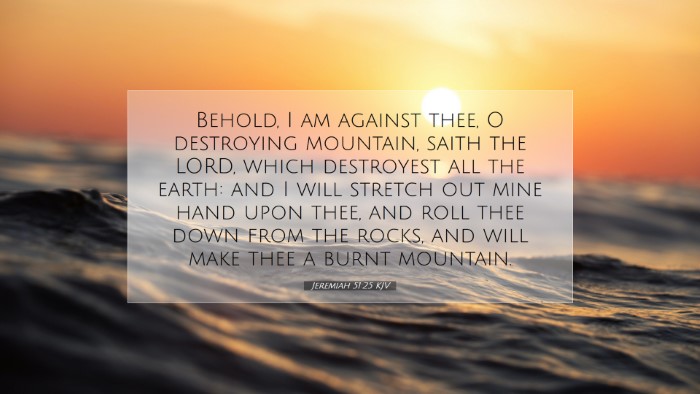Jeremiah 51:25 - Commentary Overview
Jeremiah 51:25 reads: "Behold, I am against thee, O destroying mountain, saith the Lord, which destroyest all the earth: and I will stretch out mine hand upon thee, and roll thee down from the rocks, and will make thee a burnt mountain."
This verse forms part of the prophetic pronouncement against Babylon and serves as a declaration of divine judgment against the nation that has oppressively extended its dominion over the earth. In examining this verse, we can gather insights from various public domain commentaries, particularly those of Matthew Henry, Albert Barnes, and Adam Clarke.
Contextual Analysis
The book of Jeremiah consists of prophecies addressing the nation of Judah, and by extension, the Gentile nations that would face God's judgment. Chapter 51 broadens the scope to include a severe denunciation of Babylon, representing a symbol of pride, idolatry, and oppression. The context is essential in understanding the gravity of God’s message as it is not merely a historical account but a theological stance on the nature of divine justice.
Interpretation from Matthew Henry
Matthew Henry, in his commentary, describes Babylon as a "destroying mountain," symbolizing its pride and stature. Henry suggests that God's designation of Babylon as a mountain speaks to its lofty ambitions and significant power on the world stage.
-
Divine Opposition: Henry emphasizes that God's opposition to Babylon is not merely an arbitrary act but an essential part of divine justice. God intervenes against oppression and injustice, affirming His sovereignty over the nations.
-
Transformation into Desolation: The imagery of rolling down from the rocks signifies the utter destruction that awaits Babylon. Henry comments that what once stood proud will meet a humbling fate—this is a warning to nations that defy God.
Insights from Albert Barnes
Albert Barnes offers a complementary perspective, focusing on the devastating consequences of divine judgment. According to Barnes, the metaphor of a "burnt mountain" illustrates complete desolation and ruin.
-
Symbolism of Fire: Barnes discusses the symbolic nature of fire in biblical literature, often representing purification but also judgment. In the case of Babylon, the 'burnt mountain' signifies total annihilation, cleansing the earth of its tyrannical influence.
-
Implications for the Earth: Barnes notes that Babylon's destruction serves as a warning to other nations, and ultimately to the reader, that no earthly power is beyond the reach of divine justice. He emphasizes the transient nature of worldly kingdoms in contrast to God's eternal dominion.
Reflection from Adam Clarke
Adam Clarke's commentary goes deeper into the implications of God's judgment on Babylon. He emphasizes the certainty of prophecy, stating that the prophetic declaration is bound to come to pass. Clarke observes that God's actions against Babylon serve to uphold His covenant with Israel.
-
Covenantal Faithfulness: Clarke discusses the importance of God's covenantal faithfulness. The judgment of Babylon is tied to God's promise to deliver His people from oppression, illustrating that divine sovereignty actively works for the fulfillment of His purposes.
-
Call for Repentance: Clarke implies that such prophecy acts as a call for nations and individuals to examine their paths and repent. The certainty of destruction should lead to reflection and a turning back to God, akin to the message throughout the prophets.
Theological Implications
The verdict rendered against Babylon in Jeremiah 51:25 serves not only as historical documentation but also as a theological lesson. The commentary from Henry, Barnes, and Clarke collectively emphasizes several important doctrinal truths.
-
The Sovereignty of God: The verse powerfully showcases God's control over human history and nations. No empire, regardless of its might, can escape divine scrutiny and action.
-
Moral Order in the Universe: God's judgment on Babylon illustrates the principles of justice and moral order; nations that pursue idolatry and injustice are warned of divine retribution.
-
Hope for the Oppressed: Justice against oppressors is coupled with hope for the downtrodden. God's judgment on Babylon provides assurance to His people of eventual restoration and deliverance.
Contemporary Application
For contemporary pastors and theologians, Jeremiah 51:25 and its commentary can provide significant insights for preaching and teaching. The themes of divine opposition to oppression, the assurance of God's justice, and the call to repentance remain relevant.
-
Encouragement for the Church: The church today can derive encouragement from God's judgment on corruption and evil, reassured that He stands against systems of oppression.
-
Call to Accountability: This verse serves as a reminder for believers and leaders to hold themselves accountable, ensuring their practices align with God’s moral order.
-
A Motivational Stand: Many nations today face similar vices as Babylon. Pastors can challenge their congregations to stand firm in faith and engage in societal issues with biblical integrity.
Conclusion
Jeremiah 51:25 encapsulates God's sovereign action against a nation that epitomized pride and injustice. Through the insights provided by Matthew Henry, Albert Barnes, and Adam Clarke, we gain a multilayered understanding of this passage, which has not only historical ramifications but also profound theological implications for today. In examining this verse, scholars and leaders can reflect on the nature of divine judgment, the significance of humility before God, and the call for justice in a world still marred by oppression.


